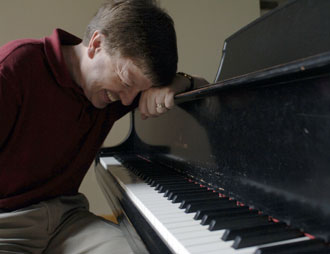 Touching Souls with Sound
Touching Souls with Sound
Quizzes for the choir? Witty T-shirts in dress rehearsal? Whether he's working with the select Chamber Singers or the larger Community Choir, Professor of Music Benjamin Locke finds ways to inspire beautiful music.
Call on the muse of silliness
In music, a discipline so reliant on emotion and expression, Ben Locke knows that humor can become an unexpected muse. It's not beyond him to walk into a dress rehearsal of the Chamber Singers wearing a T-shirt that reads "Don't wreck the requiem" or to affect exaggerated facial expressions to encourage students to put more gusto into a performance. "I'll make myself look ridiculous with a stupid pun on a T-shirt if it will help the students release some tension and work harder," he says. The Community Choir practices for two hours one evening a week, and sometimes a good laugh can be a welcome pick-me-up. "When mistakes happen, it's often better to lighten the moment so they can come at it again with a sense of renewed energy,"
says Locke.
Don't be afraid to upend your tenets
As a teacher and conductor, Locke had always frowned on the idea of incorporating dance into musical performance. "I thought it was a distraction and a matter of artifice, dressing up something that could stand on its own," he explains. But a trip to South Africa to study native music and see the Libertas Choir upended that perception. "I realized that a good portion of the South African folk songs require dancing to make them work," he says. So Locke returned to Gambier and promptly discarded the no-dancing rule as he began introducing the energetic South African material into his repertoire. "That was a stretch for me," he says. "After all my years of not allowing choirs to move a great deal, suddenly it became something for me to teach." In many ways Locke is learning the material, sung in South African languages like Xhosa, right along with his students. "It's a language that is entirely new to me, filled with clicks and pops, and suddenly I'm struggling like a beginner again," he says. "But putting myself in the position of learner makes me a more effective teacher."
Find the human element
A human face and a personal story exist behind every piece of music ever written and performed, and Locke never lets his students forget it. "We investigate a text, find the common ground of humanity, and that helps them realize you can touch souls with sound," he says. Locke's musicians don't just sing, they study. They become aware of the "sociology of singing"--so that, for example, they can perform the South African songs with a sense of community and freedom of movement reflecting the culture which inspired the music. His Chamber Singers take quizzes on the meaning behind the works they perform, particularly those sung in translation. "You need to know what the songs are about," Locke says. "The students grumble about taking quizzes, but in the end they recognize it helps them cross into the realm of performing and not just parroting out sounds."
Share your secrets
Locke loves teaching his class on conducting to music majors because he can finally share with students the tools of his trade. "They think I'm a funny guy, but when I talk about the fact that I am strategically using humor as a technique, they realize there is more manipulation to conducting than they originally thought," he says. Teaching conducting is a challenge because the skills are so abstract--how to exercise leadership, for example, or how to express and elicit emotion. Locke presses his students relentlessly to examine and hone their practices. Are they giving directions clearly? Are they muddling their speech with colloquialisms or filler words like "okay"? Are their mannerisms belying their intent? "I try to create a pressure situation," he says, "so they are actually over-prepared when they conduct their first choir."
Cast a broad net
Locke knows that only a few of his students will go on to become professional musicians. Yet whether they are preparing for a competitive career or realizing a childhood dream, he gives them all the same attention and guidance, and often finds that they blossom in ways neither he nor they expected. He recalls one student, a bass guitar player in a garage band, who took a basic musicianship class to fill a requirement. Locke discovered the student had a low voice and invited him to join the Chamber Singers to fill a gap. "He was flattered, and in joining the group, he came across a lot of musical styles he hadn't encountered until that point," Locke says. The student went on to study Johannes Brahams, attend cello camp, and try out for the Knox County Symphony. Another student who had diagnosed herself as tone-deaf signed up for voice lessons as a senior. Locke generously redefined her as a monotone and worked with her to perfect the one range she could hit successfully. She returned from winter break thrilled that she was able to sing a song with her mother. "She found success by holding her own simple melody," Locke says. "What a satisfaction that is for me--people experiencing music for themselves and uncovering a lifetime of enjoyment."
Do you have feedback on this page?
